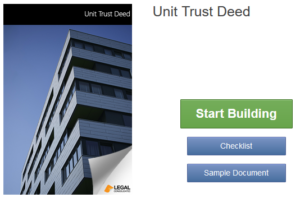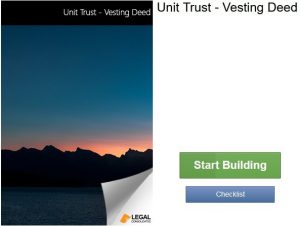Can a Unit Trust live forever?
A Unit Trust is similar to a company. Each Unit gives an exact value of the interest in the Unit Trust’s underlying assets. Say there are two units in the Unit Trust. If you own one unit, you own 50% of the Trust’s assets. If you own 1,000 of 10,000 units, you own 10% of the assets in the Unit Trust.
Like a company, a Unit Trust may issue Units in different classes. For example, tenants and investors. This gives the Unit Trust a level of discretion. Different classes have different rights.
A company has a Shareholders Agreement. The Unit Trust has a Unit Holders Agreement.
Unit Trusts lasting 80 years may be a problem. Watch a training video on our Unit Trusts operate. And Start building a Unit Trust here to learn how they operate.
The two most misunderstood factors of Unit Trusts:
- Is there a limit on the number of Unit Holders?
- Can a Unit Trust last forever?
1. Limit on the number of Unit Holders?
The Government does not want you to have too many members of the public involved in a Unit Trust. Therefore, the Government regulates the number of Unit Holders. A Unit Trust is classified as a ‘Public Unit Trust’. This is if there are 50 or more Unit Holders: s 102P(1)(c) Income Tax Assessment Act (1936).

Sure, have lots of Unit Holders. But more than 50 means you become a Public Unit Trust.
For example, the Australian Medical Unit Trust has 500 Units. It gives Units to 52 separate people. In this example, the Trust is a Public Unit Trust as it has more than 50 Unit Holders.
Becoming a Public Trust allows you to have an unlimited number of Unit Holders. But it increases administration and taxation. Your Trust is potentially taxed as a company.
A Public Unit Trust is avoidable if 20 or fewer Unit Holders own 75% of the units.
In this example, the Australian Medical Unit Trust has 500 Units. When they sell these Units they sell 375 of them to 18 Unit holders. The remaining 125 are distributed amongst the other 42 Unit Holders. This means that the first 18 Unit Holders own 75% of the overall units (375/500 = 75%).
Is your Unit Trust a Managed Investment Scheme?
Do you have more than 20 Unit Holders? Under the Corporations Act (2001) are liable for a fine and imprisonment. This is if your Unit Trust is a Managed Investment Scheme (MIS). And do not register it. In an MIS the investments are pooled together to produce a beneficial interest for the Unit Holders.
How does a Unit Trust turn into an MIS?
- You need 20 or more Unit Holders, and
- The Unit Holders don’t have the day-to-day management of the Unit Trust.
Day-to-day Management for a Managed Investment Scheme
Your Unit Trust is NOT an MIS if your Unit Holders have control of the day-to-day operations of the Trust. However, what if your Unit Holders only share in the profit? Then your Unit Trust is an MIS. If you have more than 20 Unit Holders, you are required to register your MIS. Failure results in penalties.
If you have more than 20 Unit Holders, you are required to register your MIS. Failure results in penalties. Registration as an MIS is with ASIC. It may require a Product Disclosure Statement and other formalities.
ATO’s view on when a unit trust is taxed like a company
The ATO released a Decision Impact Statement (DIS). This is on the High Court decision in ElecNet (Aust) Pty Ltd (as trustee for the Electrical Industry Severance Scheme) v FCT [2016] HCA 51.
In its decision, the High Court unanimously dismissed the taxpayer’s appeal. It confirms that the Electrical Industry Severance Scheme (EISS) was not a “unit trust”. This is within the meaning of Div 6C of Pt III ITAA 1936.
It is, therefore, not entitled to be taxed like a company. It did so on the basis of finding that the interests of the electrical industry workers in the scheme could not be characterised as “units”. In arriving at its decision, the High Court also indicated that the workers’ interests were “discretionary” in nature. This is contrary to the concept of a “unit” interest.
ATO view on taxing Unit Trusts as a company
The ATO considers that the High Court’s decision is consistent with the Commissioner’s view of the law on these issues.
The issue before the Court is whether the severance scheme was a unit trust for the purposes of Div 6C of Pt III ITAA 1936. The Court held that the rights conferred on employees by the Deed were not such as to support the conclusion that the EISS was a unit trust for the purposes of Div 6C.
But why? The ATO said that the Court considered the effect of the terms of the Deed and the construction of the terms of the provisions of Div 6C by reference to their text, context and purpose. The Court found that there is no reason in the text or context of Div 6C to attribute to the undefined expression “unit trust” any meaning other than the meaning evident from the language of Div 6C.
The ATO also notes that the High Court’s concern that characterising the severance scheme as a unit trust for the purposes of Div 6C may have the unintended and, from the perspective of the recipients, an unattractive consequence that severance payments made to workers under the scheme may be taxable in the hands of the recipients as unit trust dividends.
In summary of the ATO’s view in taxing Unit Trusts like a company:
- There is no limit on the number of Unit Holders in a Unit Trust.
- If your Trust has more than 20 Unit Holders it may need to be registered as a Managed Investment Scheme.
- If your Trust has 50 or more Unit Holders it is a Public Unit Trust. You escape this if 75% of the units are owned by 20 or fewer Unit Holders.
/unit-trust-trustee-update/
2. Can a Unit Trust last forever?
Like all good things, Unit Trusts have to come to an end. They end no later than ‘vesting day’. On vesting the assets transfer to the Unit Holders.
On vesting two taxes apply:
- Capital Gains Tax (CGT) (Federal Tax)
- Stamp Duty (State Tax on the transfer of assets)
It is a significant CGT liability. That’s not even considering Stamp. Large Unit Trusts could be paying Hundreds of thousands of dollars. Therefore, Unit Trusts try to defer this liability by making the Unit Trust exist longer.

While you can’t live forever – perhaps your Unit Trust can.
Unit Trusts lasting 80 years?
The Government does not want assets tied up in Trusts indefinitely. The Government seeks to prevent assets from falling into disrepair. A Trust can not go on longer than 80 years. This is called the Rule Against Perpetuity.
This Rule comes from English law. The 22nd Earl of Arundel in 1682, wanted to control how his titles pass for thousands of years. The Courts refused to grant an indefinite Trust. The Court limited the life of the Trust.
The 80-year Rule applies in all Australian States except one. South Australia has not adopted a Rule Against Perpetuities. Here, you do not need to have a Unit Trust lasting 80 years. They can exist indefinitely.
Don’t the Westfield Unit Trusts go forever?
There are two Westfield Trusts:
- Westfield Trust; and
- Westfield American Trust.
They are both Unit Trusts. The Unit Trusts are governed by New South Wales law.
Collectively they are worth AUS$58 Billion. Surely they cannot be subject to the 80-year period? Because the Trusts are governed by New South Wales they are subject to the Rule Against Perpetuities. Both Unit Trusts suffer the 80-year rule. The Westfield Unit Trust started in 1982. The Westfield Amercian Unt Trust started in 1996. Both terminate on their respective 80th anniversary.
/change-unit-trust-name/
South Australia: Blessing or curse?
Although South Australia may seem like a blessing, it could end up more like a curse. Here are the few issues you should be aware of if you do not want your Unit Trust to last 80 years.
Example: The Australian Medical Unit Trust has operated for 80 years. The Trust is able to live on indefinitely. However, any Unit Holder can direct the Trustee to wind up the Trust.
In practice, choosing South Australia’s laws has little value It’s usually more trouble than it’s worth. Any legal issues that arise are dealt with in South Australian Courts. You have to travel to South Australia and brief lawyers in that State. This is inconvenient and costly.
What would the Court say about 80-year Unit Trust?
If you do make it to 80 years with no problems the Court may order the Trust to wind up anyway. There is no guarantee that a Court gives effect to your choice of law: Akai Pty Ltd v The People’s Insurance Co Ltd (1996) 188 CLR 418.
This is especially when the Unit Trust has chosen South Australia to avoid the laws that would have otherwise applied. Instead, they apply the State’s laws that have a close and real connection to the Trust.
Over the years we have set up many Trusts governed by the laws of South Australia. This escapes the Unit Trusts lasting 80 years rule. To date, we have not had an attack by the ATO in respect to those Unit Trusts and Family Trusts.
Would the ATO argue that the choice of law was a breach of Part IVA Income Assessment Act (1936)? Part IVA is the general anti-avoidance provision. If you do something contrived primarily to reduce tax then the ATO disregards what you do and inflicts the tax you should pay.
Legal Consolidated’s view is that Part IVA is difficult for the ATO to sustain. There is no ‘scheme’ or convoluted array of activities. However, it is a threat.
Is South Australia the right choice for your Unit Trust?
Before choosing South Australia’s laws to govern your Trust, ask yourself these questions:
- Is there any nexus to South Australia?
- Is this connection artificial or contrived?
- Where is the asset located?
- Does the Trustee reside or carry on business in this location?
- Where is Management located?
In Summary:
- You can build a Unit Trust under South Australian jurisdiction. You can build this on our website here.
- But there is no guarantee that the Court applies South Australian law to your Unit Trust. (This is the same for Discretionary Trusts.)
Thankfully most of us are dead before an 80-year Unit Trust ends. So Unit Trusts lasting 80 years may not be an issue.
Build these Unit Trust Documents on our law firm website:
Article authored by Adj Professor Brett Davies, Partner, Legal Consolidated and Ebony Deacon, JD Law Student, UWA
| Unit Trust Deed – with pre-emptive rights and limited liability for Unitholders |
| Vesting Deed – to wind up your Unit Trust |
| Company built to be trustee of a Unit Trust – corporate trustee for asset protection |
| Change the trustees of your Unit Trust – update the trustees of your Unit Trust |
| Change the name of your Unit Trust – update the name of your Unit Trust |
| Unitholders Agreement – the Unitholders agree to follow a set of rules also protects you from litigation |